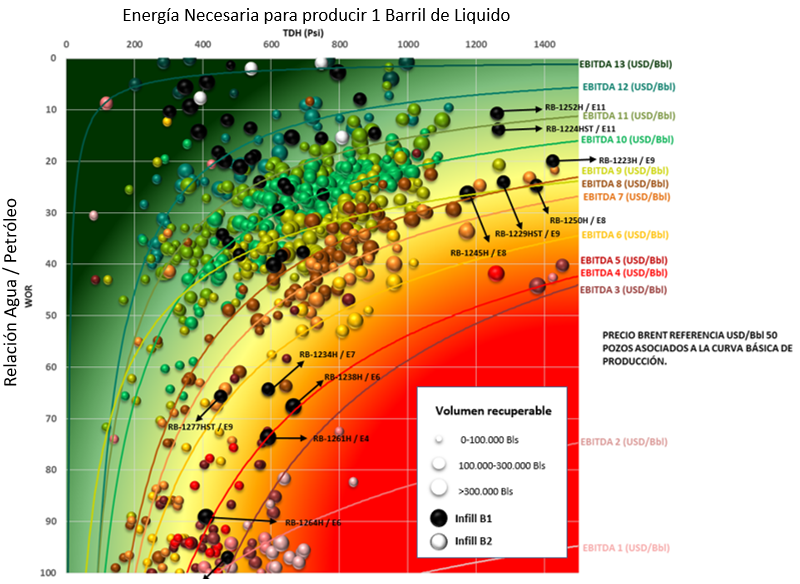Methodology for the optimization of energy consumption under financial efficiency analysis with a high impact on reducing GHG emissions. Successful application case in the largest field in Colombia.

Published 2020-12-10
Keywords
- energy consumption,
- optimized energy consumption,
- electric submersible pumping system,
- EBITDA
How to Cite
Copyright (c) 2020 Fuentes, el reventón energético

This work is licensed under a Creative Commons Attribution 4.0 International License.
Abstract
Global warming is one of the most serious environmental, social and economic threats the planet is currently facing, for this reason many companies and organizations have adopted a decisive approach to confront it. One of the most efficient strategies is reducing energy consumption, which has several advantages, such as the direct
reduction in fuel consumption, and the inclusion of more efficient technology, which is reflected in financial benefits.
This project allowed the creation of an applicable methodology for the oil and gas industry. In the process of analysis, very important alternatives were detected for optimizing energy consumption, which has an impact on the level of Greenhouse Gas Emission (GHG). These emissions, made up mainly of Carbon Dioxide, Methane, and Nitrous Oxides, constitutes a fundamental issue of sustainability worldwide.
This methodology was applied in Rubiales field, which has the highest hydrocarbon production records in the last ten years in Colombia, and whose energy consumption is high. The methodology included activities to measure the energy requirement per well, in addition to a rigorous financial analysis that allowed the evaluation and selection of candidate wells for optimization. As a result, various tasks were identified and later classified under the implementation of the analysis of expected current net value and investment efficiency.
Downloads
References
Camargo, D. B., Orozco, S. H., Ortíz, E. J. F., & Valbuena, H. R. (2020). Consumo de energía, crecimiento económico y emisión de dióxido de carbono en Colombia. Fuentes: El reventón energético, 18(1), 41-50.
Lopez, J. (2016). Modelo de Producción Eficiente Rubiales. Ecopetrol S.A. Bogotá, Colombia.
Lopez, J. (2016). Límite Económico de Pozos, campo Rubiales. Ecopetrol S.A. Bogotá, Colombia.
Sáchica, C. V., (2018). Estudio de Factibilidad Tecnico-económica de la optimización de sistemas de levantamiento artificial del campo Rubiales para la disminución del consumo energético. Universidad Industrial de Santander. Bucaramanga, Colombia.
Sáchica, J. A., (2017). WOR Analysis for Optimizing Oil Recovery in the Largest Oil Field of Colombia. XVII Congreso Colombiano del Petróleo. ACIPET-TEC 112. Bogotá, Colombia.
Sáchica, J. A., (2016). Maximización de la eficiencia de producción por pozo con base en el análisis histórico del WOR. Ecopetrol S.A. Bogotá, Colombia.
IFP School. (2019). MOOC Energy Transition. París, Francia.
Sáchica, J.A., (2017). Caño Sur Este, and example of an optimizing field in low petroleum price scenarios. Ecopetrol SA. XVII Congreso Colombiano del Petróleo. ACIPET. Bogotá Colombia.
Yanez E. and, Sáchica J. A., et al. (2015). EPA Environmental Protection Agency, dentro del marco de la Iniciativa Global de Metano. EPA, Vancouver, Canadá.
Ramirez, A. T. O., Maldonado, D. F. M., & Rodríguez, E. D. O. (2019). Revisión general de la producción elevada de agua en la industria del petróleo. Fuentes, el reventón energético, 17(2), 39-50.
Sáchica, J.A., Barrios, W. et al. (2015). Reduced Emissions and Increased Production Through Gas Compressors: Pilot Case in Colombia. SPE 173602-MS. Oklahoma, USA.